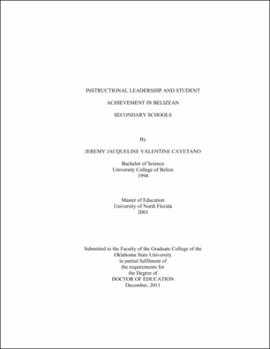| dc.contributor.advisor | Krumm, Bernita | |
| dc.contributor.author | Cayetano, Jeremy Jacquelin Valentine | |
| dc.date.accessioned | 2013-11-26T08:34:17Z | |
| dc.date.available | 2013-11-26T08:34:17Z | |
| dc.date.issued | 2011-12 | |
| dc.identifier.uri | https://hdl.handle.net/11244/7339 | |
| dc.description.abstract | Scope and Method of Study: | |
| dc.description.abstract | The hypotheses were tested through quantitative non-experimental methodology. The study is considered to be causal comparison research. The purpose was to determine if differences existed in CXC scores of students in Mathematics and English Language at secondary schools with and without leaders who exemplify instructional leadership behavior. Differences among the scores of students based on the instructional leadership behavior of the principals were determined through the computation of the Analysis of Variance (ANOVA). The statistical analyses were done using IBM SPSS Statistic version 19. | |
| dc.description.abstract | Findings and Conclusions: | |
| dc.description.abstract | The results indicate differences in the scores of students based on the instructional leadership behaviors of the principals. Students attending schools led by instructional leaders performed better in general than students attending schools not led by instructional leaders. The results also indicated that students attending secondary schools with entrance requirements perform better academically than students who attend schools with no entrance requirements. | |
| dc.description.abstract | Recommendations: | |
| dc.description.abstract | The Ministry of Education can improve the status-quo by helping the leaders of all learning institutions in the country become qualified in leadership. The ministry should also adopt a policy that insists all principals lead according to the instructional leadership model. Principals in Belize need to adopt instructional leadership principles of defining and communicating shared goals, monitoring and providing feedback on the teaching and learning process, and promoting school-wide professional development. | |
| dc.description.abstract | Teachers need to see themselves as co-leaders in the institutions where they teach and be open to the ideas of professional development, supervision, and curriculum development. All of these lead to quality instruction which is an indication of improved learning. | |
| dc.description.abstract | Parents have two issues to bear in mind as they choose educational institutions for their children to attend. First, students who attend secondary schools led by instructional leaders perform better than students who do not attend such institutions. Second, students who attend schools that have entrance requirements perform better than students who attend schools that have no entrance requirements. | |
| dc.format | application/pdf | |
| dc.language | en_US | |
| dc.rights | Copyright is held by the author who has granted the Oklahoma State University Library the non-exclusive right to share this material in its institutional repository. Contact Digital Library Services at lib-dls@okstate.edu or 405-744-9161 for the permission policy on the use, reproduction or distribution of this material. | |
| dc.title | Instructional leadership and student achievement in Belizean secondary schools | |
| dc.contributor.committeeMember | Mwarumba, Mwavita Mwarumba | |
| dc.contributor.committeeMember | Harris, Edward | |
| dc.contributor.committeeMember | Moore, Tami | |
| osu.filename | Cayetano_okstate_0664D_11790 | |
| osu.accesstype | Open Access | |
| dc.type.genre | Dissertation | |
| dc.type.material | Text | |
| dc.subject.keywords | instructional | |
| dc.subject.keywords | leadership | |
| thesis.degree.discipline | Teaching and Curriculum Leadership | |
| thesis.degree.grantor | Oklahoma State University | |
